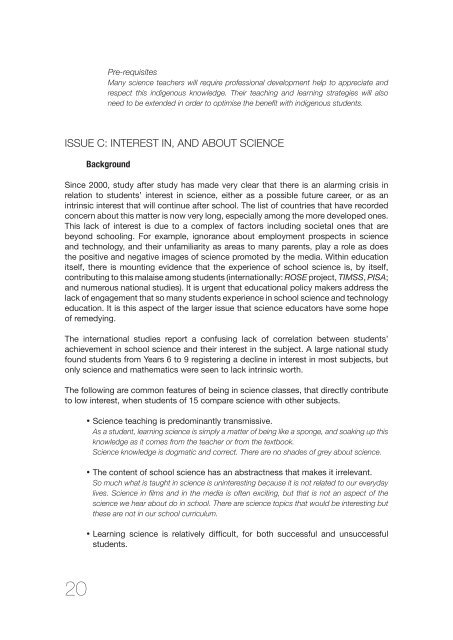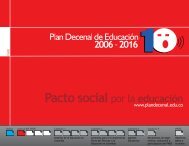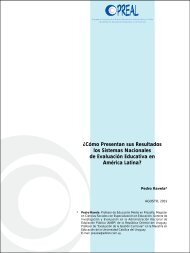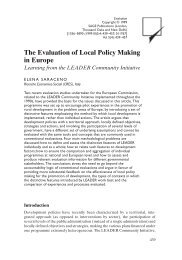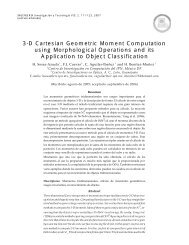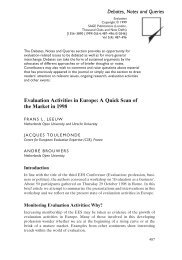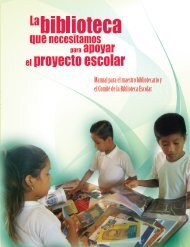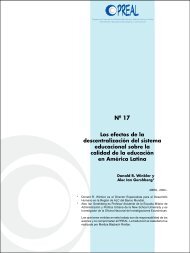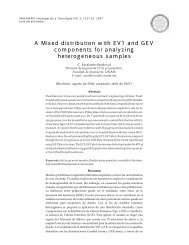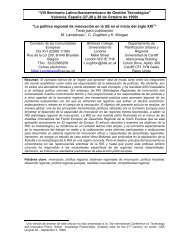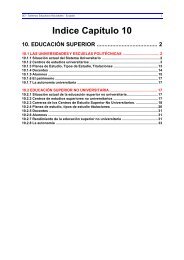Science education policy-making: eleven emerging issues; 2008 - OEI
Science education policy-making: eleven emerging issues; 2008 - OEI
Science education policy-making: eleven emerging issues; 2008 - OEI
Create successful ePaper yourself
Turn your PDF publications into a flip-book with our unique Google optimized e-Paper software.
Pre-requisites<br />
Many science teachers will require professional development help to appreciate and<br />
respect this indigenous knowledge. Their teaching and learning strategies will also<br />
need to be extended in order to optimise the benefi t with indigenous students.<br />
ISSUE C: INTEREST IN, AND ABOUT SCIENCE<br />
Background<br />
Since 2000, study after study has made very clear that there is an alarming crisis in<br />
relation to students’ interest in science, either as a possible future career, or as an<br />
intrinsic interest that will continue after school. The list of countries that have recorded<br />
concern about this matter is now very long, especially among the more developed ones.<br />
This lack of interest is due to a complex of factors including societal ones that are<br />
beyond schooling. For example, ignorance about employment prospects in science<br />
and technology, and their unfamiliarity as areas to many parents, play a role as does<br />
the positive and negative images of science promoted by the media. Within <strong>education</strong><br />
itself, there is mounting evidence that the experience of school science is, by itself,<br />
contributing to this malaise among students (internationally: ROSE project, TIMSS, PISA;<br />
and numerous national studies). It is urgent that <strong>education</strong>al <strong>policy</strong> makers address the<br />
lack of engagement that so many students experience in school science and technology<br />
<strong>education</strong>. It is this aspect of the larger issue that science educators have some hope<br />
of remedying.<br />
The international studies report a confusing lack of correlation between students’<br />
achievement in school science and their interest in the subject. A large national study<br />
found students from Years 6 to 9 registering a decline in interest in most subjects, but<br />
only science and mathematics were seen to lack intrinsic worth.<br />
The following are common features of being in science classes, that directly contribute<br />
to low interest, when students of 15 compare science with other subjects.<br />
• <strong>Science</strong> teaching is predominantly transmissive.<br />
As a student, learning science is simply a matter of being like a sponge, and soaking up this<br />
knowledge as it comes from the teacher or from the textbook.<br />
<strong>Science</strong> knowledge is dogmatic and correct. There are no shades of grey about science.<br />
• The content of school science has an abstractness that makes it irrelevant.<br />
So much what is taught in science is uninteresting because it is not related to our everyday<br />
lives. <strong>Science</strong> in fi lms and in the media is often exciting, but that is not an aspect of the<br />
science we hear about do in school. There are science topics that would be interesting but<br />
these are not in our school curriculum.<br />
• Learning science is relatively difficult, for both successful and unsuccessful<br />
students.<br />
20


